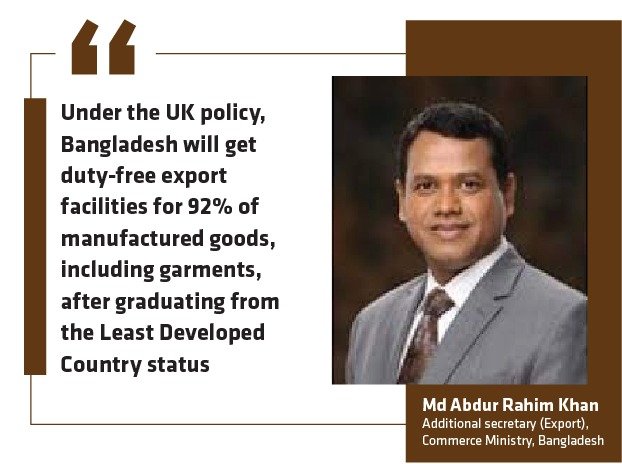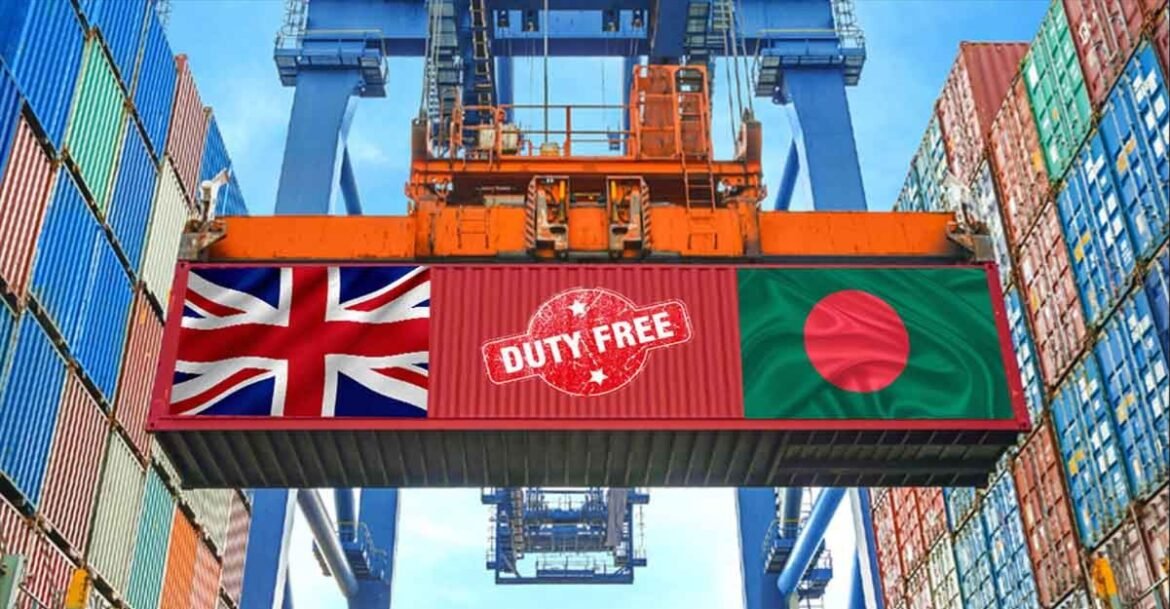Officials from the commerce ministry have indicated that the United Kingdom will extend various benefits to Bangladesh through the Generalized Scheme of Preferences (GSP) for a period of three years following its transition out of the Least Developed Country (LDC) status, expected to take place in 2026. Following this transition, Bangladesh will be eligible for duty-free export privileges for 92% of tariff line products, which encompass items such as ready-made garments (RMG), when accessing the UK market.

According to sources present during a meeting of the joint working group focused on enhancing bilateral trade and investment between the two nations, the UK has provided assurance to Bangladesh regarding the removal of the current restriction on the export of betel leaf from Bangladesh.
UK trade scheme strengthens Bangladesh’s post-LDC economy
The UK delegation said their Developing Countries Trading Scheme is very generous and flexible. Under the UK policy, Bangladesh will get duty-free export facilities for 92% of manufactured goods, including garments, after graduating from Least Developed Country status,” Md Abdur Rahim Khan, additional secretary (Export) of the commerce ministry, who led the Bangladesh delegation at the meeting held in the capital yesterday.
You can also read: U.S. Deploys Thousands of Troops to Red Sea Amid Escalating Iran Tensions
Commerce ministry officials said the UK will continue providing Bangladesh with different facilities under the Generalized Scheme of Preferences (GSP) for three years as a transition period after LDC graduation in 2026. The group of least developed countries, including Bangladesh, has applied to the World Trade Organization seeking GSP benefits for six years after LDC graduation. At the joint working group meeting yesterday, Dhaka also proposed that the UK continue the facilities for six years following LDC graduation as a transition period.
The UK delegation said they will discuss the matter at their policy level, a senior official present at the meeting.
Before Brexit, the European Union imposed a ban on betel leaf imports from Bangladesh almost a decade ago. In 2021, the EU lifted the ban, but it is still in place in the UK.
In response to Bangladesh’s request yesterday, the UK delegation said they too will follow the EU’s decision to lift the ban on betel leaf export and discuss the matter with their Food Standards Agency, said Md Abdur Rahim Khan.
During the meeting, Bangladesh also deliberated on the potential expansion of agricultural product exports, particularly emphasizing
- frozen fish
- shrimp
- frozen foods
- Mangoes
- Vegetables, to the UK.
On the other hand, the UK has emphasized the formulation of rules regarding cross-border higher education and the enforcement of intellectual property rights.
Conversely, the UK has highlighted the importance of establishing regulations for cross-border higher education and ensuring the protection and enforcement of intellectual property rights.
Bangladesh’s FY23 UK exports hit $5.3b
As per data from the commerce ministry, Bangladesh’s merchandise exports to the United Kingdom reached a peak of $5.3 billion in the fiscal year 2022-23 (FY23), marking an increase from $4.8 billion in the preceding fiscal year and a doubling of the amount from a decade ago, when it was at $2.7 billion.
The pivotal export items that contributed to this noteworthy accomplishment encompass
- ready-made garments
- frozen edibles
- information technology services
- engineering products
- leather
- jute goods and
- bicycles.
Notably, approximately 80% of these exports consist of knitwear and woven clothing.
During the initial 11 months of FY23 until May, Bangladesh’s imports from the UK totaled $380 million. A senior official from the commerce ministry projected that this figure was anticipated to reach around $450 million by the conclusion of the fiscal year on June 30th.
Currently, the UK is the third largest export destination for Bangladesh, following the European Union and the United States.
Duty-free access to the UK offers a boost to exports for Bangladesh
The UK’s ‘DCTS Enhanced Preferences’ extend duty-free access to nations like Bangladesh, creating a chance for the country to broaden its export range and attain unrestricted entry into the British market. This has the potential to generate valuable foreign exchange earnings, benefiting Bangladesh’s economy.
However, realizing these advantages necessitates thorough policy-level examination to tackle issues tied to misinformation, inadequate information, and alignment with UK standards. Research and Policy Integration for Development (RAPID), a Bangladeshi think tank, views the DCTS as a possible transformative factor, liberating the nation from its heavy reliance on the ready-made garments (RMG) sector for exports.
Growing sectors such as footwear, including synthetic variants, have exhibited promising growth trajectories. By actively promoting exports across diverse industries, Bangladesh can diversify its footprint in new markets and introduce innovative products. Even though the UK market is familiar, the DCTS presents fresh opportunities for Bangladeshi enterprises.
Challenges for Bangladesh’s export expansion
According to RAPID, there’s a significant lack of awareness between UK buyers and Bangladeshi sellers. UK buyers aren’t familiar with Bangladeshi products, and this issue stems from poor communication. To bridge this gap, informal information exchange between Bangladeshi trade bodies and foreign counterparts, along with government-funded efforts like road-shows, is needed.
Adapting to the UK’s strict standards requires collaboration between the government and international organizations. Policymakers should focus on diversifying exports beyond the RMG sector, like footwear, by providing similar benefits.
The recent banking sector downgrade by Moody’s emphasizes the urgency of this diversification. With policy support, Bangladesh can transition from single-sector to multi-product exports, but it hinges on policymakers’ commitment.


